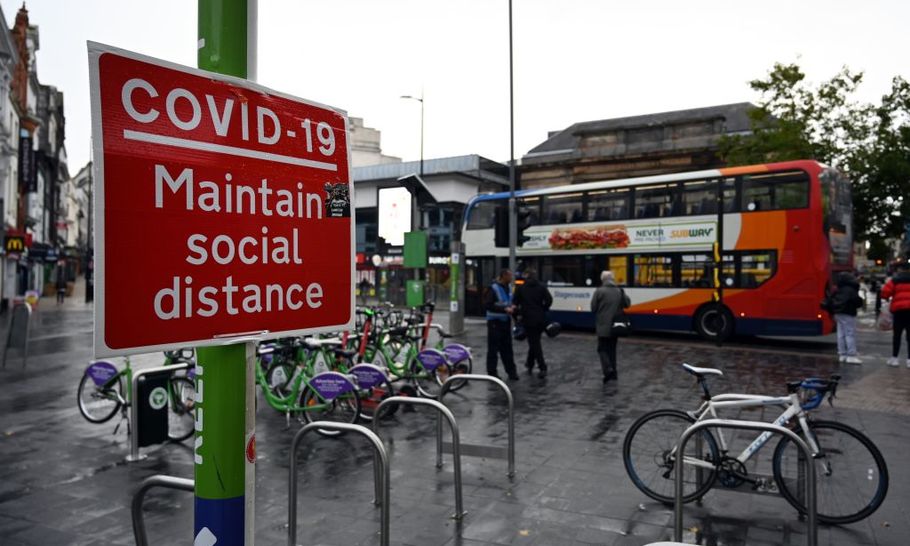On local lockdowns, the watchword should be: not coercion, but consent

(Photo by PAUL ELLIS/AFP via Getty Images)
Is the Government justified in restricting our liberties in order to protect us from the consequences of our own folly — if folly it is? The ever more minute regulation of our lives long preceded the onset of Covid-19, but state control is now attaining ever more onerous levels. In his statement on Monday, the Prime Minister appealed to local leaders in the North-West to “toughen” lockdown in areas designated “very high” under his new three-tier system.
Congratulating Steve Rotheram, Metropolitan Mayor of Liverpool, for his proactive measures — such as closing gyms, casinos and betting shops — Boris Johnson warned that he would not hesitate to impose closures if local authorities refused to co-operate: “If we can’t get agreement, then clearly it is the duty of national government to take the necessary action to protect the public.”
Is he right? Is it “clearly” his “duty” to snuff out the flickers of recovery in places that are already staring into an economic abyss? There is more resistance today from regional representatives than last March, but public support for lockdowns still appears to be strong. The Prime Minister insists that hospital admissions are already higher than when the first lockdown was announced. Deaths are bound to rise again, as older generations are infected by younger ones. A majority of the public would even support a return to nationwide lockdown if it became necessary, though Boris Johnson is treating that option as a last resort, hoping against hope that it won’t be needed. The threat of lockdown is stronger than the execution.
Yet the self-harm that is already being inflicted on the country goes far beyond the loss of family incomes and the suppression of business activity. Social life has now been on hold for more than half a year and it is taking a toll that may be less visible in statistics than infection and death, but is no less real for that. The nanny state — a cliché much used by Boris Johnson in his days as a journalist — is in danger of killing us with kindness. The yawning absence of human contact has, for many, robbed life of its meaning.
We now find ourselves in a predicament in which it would have been good to hear from the late Sir Samuel Brittan, who was not only the shrewdest economic commentator of the last half-century, but in his own modest way a moral and political philosopher too. He was not, as the subheading on the the Times obituary claims, a “libertarian”, but he subscribed to the broad principles outlined in Mill’s On Liberty: that the law should leave us alone unless and until we encroach on the liberties of others.
Yet in his last book, Against the Flow (2005), Brittan wrote: “We were at all times in danger of forgetting — until rudely awoken by the attack on the New York Twin Towers of September 11, 2001 — that the primary role of government is to look after the physical security of the population and that all else is secondary.” Boris Johnson was schooled in the same classical liberal tradition and sees the role of the state in much the same way.
The problem created by the pandemic is: what are the limits of state interference in our daily lives beyond which necessary protection becomes oppressive coercion? There is no general principle that can give us the answer to this question. There are only pragmatic, piecemeal decisions that collectively add up to a condition that is either tolerable for a “freedom-loving people” (as Boris Johnson knows us to be) — or it is not. We are perilously close to the limits of that tolerance, beyond which civil disobedience begins. Once it has begun, there is no knowing where it will stop.
A comparison with Germany might be helpful, not least because that country has limited the damage done by the coronavirus crisis, both to prosperity and to liberty, better than Britain. There, a heated debate is under way about the Federal Government’s attempt to prevent people from cities with a high rate of infection, such as Frankfurt or Berlin, not from travelling to less affected areas, but staying overnight there. This rule, besides being unenforceable, has proved unpopular.
Now Chancellor Merkel is meeting provincial leaders from the states, or Länder, to hammer out a compromise — much like Boris Johnson. Thanks to Germany’s long history of fragmentation during the Holy Roman Empire, followed by an shorter period of centralisation that culminated in the Nazi and Communist dictatorships, the rights and privileges of the Länder are enshrined in the Basic Law. So there is no question of the Federal Government overriding regional administrations, each of which has its own prime minister. These are the powerbrokers of politics.
It is more than likely that Angela Merkel will gracefully concede permission for overnight stays, if only because the Germans have always been a nation of travellers. If their Wanderlust is in temporary abeyance due to international quarantines, even inside the EU, the right to travel inside Germany is all the more essential to a sense of well-being. No evidence has yet been produced to justify the ban on overnight stays. If and when it is, the equally German respect for science will doubtless prevail over the urge to travel for business or pleasure.
Here, too, the needs of regional and local communities should command more respect from a Government that is sometimes intolerant of dissent. But there must be give and take: if cities such as Liverpool, Manchester and Nottingham expect billions in aid to flow from Westminster, they must limit their own liberties in return. The Government’s watchword should be: not coercion, but consent.





